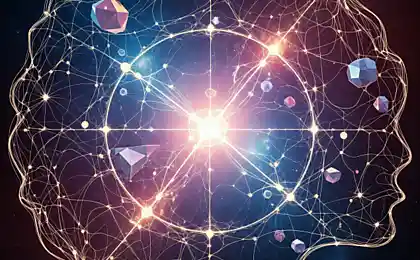232
How we unconsciously give up on happiness
This article will help you understand why we unknowingly give up happiness. Instead of accepting happiness, we criticize, blame others, and remain in unhappiness.
This is because of an unconscious life. A conscious life is a life of understanding and real acceptance of oneself as a person capable of achieving anything one wants. It all depends on our choices. The choice to be happy right here and now! Choosing to work in a job that brings happiness. The choice to be loved and to love.

Unconsciously giving up everything that can make you happy is for the simple reason that you are mostly unconscious. But as paradoxical as that sounds, Most people do not want to accept and realize that important moment for correcting certain problems.
They feel that they are aware of everything, and every action is done under the watchful eye of the conscious self. That's not really true.
For example, a man constantly changes jobs at intervals of 6 months. On a rational level, he makes various excuses: “I quit this job because....” In fact, after the analysis, he sees that this was driven by his unresolved conflict with his father, which he constantly transferred to the leader, and generally fear of society.
Examples like this from my Practice shows that the unconscious rejection of success, health and happiness we are motivated by programs coming from the family, early childhood. Therefore, when you complain that you are unhappy, you can say after reading this material: “I want to become aware of what is preventing me from becoming happy.”
It should be remembered that any information on this topic is useless if you do not act. "How do I act?" they ask me. Formulate a query for what you want here and now, and do whatever it takes to get the result.
Sometimes a student comes to me and says, “You know, nothing has changed for me yet.” To which I reply, “There seems to be no full awareness of what is resisting within you against your request.”
You should know that by working through your complexes, internal conflict, you create a basis for the inner self to automatically work out the obstacle to obtaining the desired answer to the query.
Without a foundation called “awareness,” a person will constantly create problems and suffer.Just like the Titanic crashed on an invisible part of the iceberg. In a state of awareness, a person in his living space (whatever he does) falls, takes the disease as a lesson, successfully passes it and goes on, and the neurotic after the fall continues to lie down and suffer.
In other words, the neurotic rejects the lesson learned, criticizes, blames others for his problems, and suffers further.
In order for you to realize your resistance to happiness right now, you need to ask yourself the following question.What would I do now if I were offered:
Think for a few minutes and write down the answers, the feelings, the images that just spontaneously came to mind after reading these questions.
For example, if you have a fear of the unknown (work, place of residence, etc.), then perhaps this fear does not allow you to live one hundred percent.

What helps to remove the obstacle to happiness?
The first thing to consider is how the law of the mirror works.. Everything that happens to us and around us is a reflection of what is happening in the depths of our being. Therefore, you do not need to look for the answer to the question “How to remove the obstacle to happiness?” outside. He's inside you. Pythagoras wrote about this:Do not pursue happiness, it is always within you.?
The second step in dealing with the obstacle to happiness is forging a good working alliance with your unconscious. Without this, you will not get anything in terms of self-correction, just as a parent does not get anything good in the process of upbringing if he has poor psycho-emotional contact with his child.
Further, when you turn to yourself, to the depths of your self, you automatically become aware of the here and now. The inner working alliance with your self, as in the case of the therapeutic alliance, enables you to perform various psychoanalysis procedures, overcome your own resistance to painful insights, and expand your awareness of yourself and the living space in general.
Such work helps to be honest in the process of introspection, to be aware of the inner field of the “I”For example, conducting an exemplary dialogue with myself: “I cannot marry because I resist it, not because there are no worthy partners” or “I have a conflict with children because I am anxious and interfere in their lives...”
You may agree that at first glance, these are very simple phrases. And in practice, only a few can pronounce them, much less work in the psychoanalytic space.
Psychoanalysis shows that you should always look for a way out of a problem in the situation that led you to it. Simply put, where the exit is, there is the entrance. More often, the entrance and exit into the space of the problem is a psychotrauma in the primary relationship with parents. Therefore, you do not need to look for a way out of the problem in alcohol, medications, etc.
It's about understanding how childhood trauma still governs your destiny. For example, a young woman says, “I’ve reached a dead end...” No man I have met on my journey is fit for me.” What do you think, where and how does this woman get out of the deadlock?
Perhaps you are already coming to understand that she has to realize in the here and now mode how the absence of her father or the denial of him on her part and on the part of her mother maintains in her unconscious the format of a negative image of a man and in general distorts her perception of relations with him.
In addition to realizing your inner conflicts, you must accept the idea that there are always ups and downs in your life at all levels.. Watch how your chest moves right now. You see, when you breathe in, it rises, and when you breathe out, it drops. And we don't get upset when it goes down.
A conscious person is not upset if there is a fall (stress situation). He knows that this is a lesson he must learn and move on. A neurotic can't do that. He misses another lesson, a clue, and creates another obstacle to happiness. He's no different than a schoolboy. Only a student is afraid of school, and a neurotic is afraid of life in general.
Although the mind, body, events and suggest how to remove obstacles on the way to happiness, the neurotic is not ready to look at himself from the outside, to see and recognize what is happening. More often he reproaches the other for what he cannot give.

Developing awareness of obstacles to happiness
When you read such texts and do psychotechnics, you automatically develop awareness. By focusing your conscious ray on what you are feeling right now, what your body is experiencing, what is happening in your life, you are able to understand yourself and control your psychic energy and body, to get an answer to the request from the general information field.
So, next, I want to suggest an exercise for mindfulness.
Handling your inquiry
Sit comfortably, close your eyes and do a relaxation exercise. After that, open your eyes and write 3 wishes on a pre-prepared piece of paper that are very important for you today. Choose the average desire (2nd from your list). Ask yourself, “What have I done today (actions, thoughts, etc.) to make this wish not come true?” ?
Then ask yourself, “How do I justify my inaction here and now?” Are you aware of something you didn’t realize you weren’t happy before?
Close your eyes and breathe calmly through your nose. Imagine that your wish has been fulfilled. Visualize a picture of what is happening... Take a deep breath and exhale and open your eyes.
Write what you realize after doing this technique in your health diary.
In conclusion, I would like to give A few useful questions that will help you remove obstacles to happiness in time.
So in this piece, I wanted to lead you to the idea that when we become aware, we take control of our lives. This is confirmed by the practice of life and thinkers of all times. In particular, D. Locke wrote about this as follows: “Happiness and unhappiness of a person are for the most part the work of his hands.”
Author: A. Sarakul
Source: www.transurfing-real.ru/2016/10/blog-post_315.html
This is because of an unconscious life. A conscious life is a life of understanding and real acceptance of oneself as a person capable of achieving anything one wants. It all depends on our choices. The choice to be happy right here and now! Choosing to work in a job that brings happiness. The choice to be loved and to love.

Unconsciously giving up everything that can make you happy is for the simple reason that you are mostly unconscious. But as paradoxical as that sounds, Most people do not want to accept and realize that important moment for correcting certain problems.
They feel that they are aware of everything, and every action is done under the watchful eye of the conscious self. That's not really true.
For example, a man constantly changes jobs at intervals of 6 months. On a rational level, he makes various excuses: “I quit this job because....” In fact, after the analysis, he sees that this was driven by his unresolved conflict with his father, which he constantly transferred to the leader, and generally fear of society.
Examples like this from my Practice shows that the unconscious rejection of success, health and happiness we are motivated by programs coming from the family, early childhood. Therefore, when you complain that you are unhappy, you can say after reading this material: “I want to become aware of what is preventing me from becoming happy.”
It should be remembered that any information on this topic is useless if you do not act. "How do I act?" they ask me. Formulate a query for what you want here and now, and do whatever it takes to get the result.
Sometimes a student comes to me and says, “You know, nothing has changed for me yet.” To which I reply, “There seems to be no full awareness of what is resisting within you against your request.”
You should know that by working through your complexes, internal conflict, you create a basis for the inner self to automatically work out the obstacle to obtaining the desired answer to the query.
Without a foundation called “awareness,” a person will constantly create problems and suffer.Just like the Titanic crashed on an invisible part of the iceberg. In a state of awareness, a person in his living space (whatever he does) falls, takes the disease as a lesson, successfully passes it and goes on, and the neurotic after the fall continues to lie down and suffer.
In other words, the neurotic rejects the lesson learned, criticizes, blames others for his problems, and suffers further.
In order for you to realize your resistance to happiness right now, you need to ask yourself the following question.What would I do now if I were offered:
- change jobs;
- change the place of residence;
- Divorce?
Think for a few minutes and write down the answers, the feelings, the images that just spontaneously came to mind after reading these questions.
For example, if you have a fear of the unknown (work, place of residence, etc.), then perhaps this fear does not allow you to live one hundred percent.

What helps to remove the obstacle to happiness?
The first thing to consider is how the law of the mirror works.. Everything that happens to us and around us is a reflection of what is happening in the depths of our being. Therefore, you do not need to look for the answer to the question “How to remove the obstacle to happiness?” outside. He's inside you. Pythagoras wrote about this:Do not pursue happiness, it is always within you.?
The second step in dealing with the obstacle to happiness is forging a good working alliance with your unconscious. Without this, you will not get anything in terms of self-correction, just as a parent does not get anything good in the process of upbringing if he has poor psycho-emotional contact with his child.
Further, when you turn to yourself, to the depths of your self, you automatically become aware of the here and now. The inner working alliance with your self, as in the case of the therapeutic alliance, enables you to perform various psychoanalysis procedures, overcome your own resistance to painful insights, and expand your awareness of yourself and the living space in general.
Such work helps to be honest in the process of introspection, to be aware of the inner field of the “I”For example, conducting an exemplary dialogue with myself: “I cannot marry because I resist it, not because there are no worthy partners” or “I have a conflict with children because I am anxious and interfere in their lives...”
You may agree that at first glance, these are very simple phrases. And in practice, only a few can pronounce them, much less work in the psychoanalytic space.
Psychoanalysis shows that you should always look for a way out of a problem in the situation that led you to it. Simply put, where the exit is, there is the entrance. More often, the entrance and exit into the space of the problem is a psychotrauma in the primary relationship with parents. Therefore, you do not need to look for a way out of the problem in alcohol, medications, etc.
It's about understanding how childhood trauma still governs your destiny. For example, a young woman says, “I’ve reached a dead end...” No man I have met on my journey is fit for me.” What do you think, where and how does this woman get out of the deadlock?
Perhaps you are already coming to understand that she has to realize in the here and now mode how the absence of her father or the denial of him on her part and on the part of her mother maintains in her unconscious the format of a negative image of a man and in general distorts her perception of relations with him.
In addition to realizing your inner conflicts, you must accept the idea that there are always ups and downs in your life at all levels.. Watch how your chest moves right now. You see, when you breathe in, it rises, and when you breathe out, it drops. And we don't get upset when it goes down.
A conscious person is not upset if there is a fall (stress situation). He knows that this is a lesson he must learn and move on. A neurotic can't do that. He misses another lesson, a clue, and creates another obstacle to happiness. He's no different than a schoolboy. Only a student is afraid of school, and a neurotic is afraid of life in general.
Although the mind, body, events and suggest how to remove obstacles on the way to happiness, the neurotic is not ready to look at himself from the outside, to see and recognize what is happening. More often he reproaches the other for what he cannot give.

Developing awareness of obstacles to happiness
When you read such texts and do psychotechnics, you automatically develop awareness. By focusing your conscious ray on what you are feeling right now, what your body is experiencing, what is happening in your life, you are able to understand yourself and control your psychic energy and body, to get an answer to the request from the general information field.
So, next, I want to suggest an exercise for mindfulness.
Handling your inquiry
Sit comfortably, close your eyes and do a relaxation exercise. After that, open your eyes and write 3 wishes on a pre-prepared piece of paper that are very important for you today. Choose the average desire (2nd from your list). Ask yourself, “What have I done today (actions, thoughts, etc.) to make this wish not come true?” ?
Then ask yourself, “How do I justify my inaction here and now?” Are you aware of something you didn’t realize you weren’t happy before?
Close your eyes and breathe calmly through your nose. Imagine that your wish has been fulfilled. Visualize a picture of what is happening... Take a deep breath and exhale and open your eyes.
Write what you realize after doing this technique in your health diary.
In conclusion, I would like to give A few useful questions that will help you remove obstacles to happiness in time.
- Do I know what I want here and now?
- Am I criticizing, judging, complaining, evaluating or training in terms of awareness and acting to get what I asked for?
- How do I resist changes in my life?
- Do I always know what the final result of my request looks like?
- How often do I exercise my will and ability to act?
So in this piece, I wanted to lead you to the idea that when we become aware, we take control of our lives. This is confirmed by the practice of life and thinkers of all times. In particular, D. Locke wrote about this as follows: “Happiness and unhappiness of a person are for the most part the work of his hands.”
Author: A. Sarakul
Source: www.transurfing-real.ru/2016/10/blog-post_315.html
Life script of the mother — mould of the future life of the daughter
Sondors: the most affordable electric vehicle priced at $10 thousand























